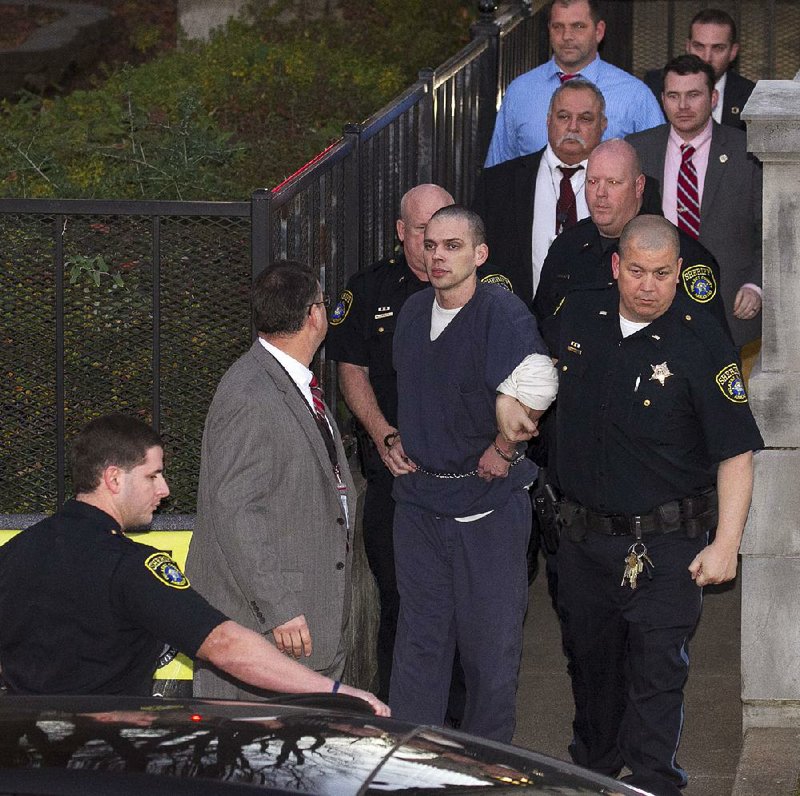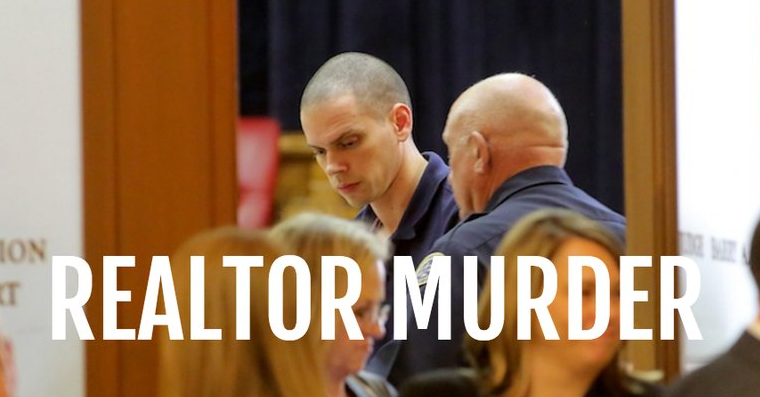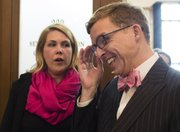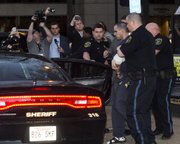The Jacksonville man who killed real estate agent Beverly Carter and buried her body behind a concrete plant was sentenced to two life terms in prison Friday after a four-day trial.
REALTOR-SLAYING TRIAL

Beverly Carter
Realtor who was reported missing after showing a house in Scott. Her body was found days later buried behind a Cabot concrete plant.Arron Lewis
The man charged with capital murder and kidnapping in Carter's killing. Prosecutors are seeking a life sentence.

John Johnson
Chief deputy prosecuting attorney for the Sixth Judicial District. Johnson will present the state's case.Bill James
Lead defense attorney for Lewis.
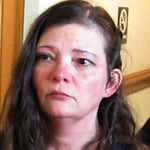
Crystal Lowery
Lewis' wife who earlier pleaded guilty to first-degree murder and kidnapping charges. She is expected to testify.Herbert Wright
Pulaski County circuit judge, who will preside over the proceeding.
The nine women and three men on the jury deliberated an hour to find 35-year-old Arron Lewis guilty of all charges: capital murder and kidnapping.
One life sentence was imposed automatically because of Lewis' capital-murder conviction, but the second life term was imposed by jurors, who took six minutes to decide the punishment.
Circuit Judge Herb Wright ordered the sentences to run back to back.
The victim's son, Carl Carter Jr., and his wife, Kim, cried and held hands as the judge read the verdict.
Prosecutors said Beverly Carter, a married mother of three, died in agony and terror as she suffocated under green tape that Lewis had wrapped across her face after his and his wife's plans to hold her for ransom fell apart.
Carter's son told jurors during the sentencing phase of the case that his family has been brutalized by Lewis' claims over the past year that Lewis had been sexually involved with Beverly Carter. The family was further hurt when during the trial the defense questioned his parents' commitment to each other, he said. The couple was married for 35 years, he said.
"She loved my dad so much," the younger Carter told jurors as his father sobbed in the audience.
His voice quivered as he remembered his mother's smile and laughter "that would fill up a room" and how she doted on her five grandchildren, teaching them to ride bicycles, tie their shoes and eat entire boxes of Little Debbie cakes.
"We had so many good years left with her," he said. "This world is a darker place without her."
In closing arguments, deputy prosecutor Barbara Mariani held up a roll of bright-green tape and pulled off an arm's length of it, producing a sudden ripping noise that startled some spectators.
"This is a murder weapon," she told the jurors, holding the tape stretched between her outstretched arms. "That is the last thing Beverly Carter heard. This is the last thing Beverly Carter saw."
Mariani held up a crime-scene photograph of the dead woman lying bound and gagged in green tape in the hole where investigators found her.
"That's what he did to Beverly," she said. "I'm here to fight for her because she can't fight the ... victim-bashing defense herself."
She called on jurors to resist "absurd" claims by Lewis that Carter had willingly been with him and his wife when she died.
Mariani said Lewis wanted to defile the woman's reputation in death as he had brutalized her in life. The best medical evidence completely invalidates the account Lewis gave of how Carter died, Mariani said.
"It wasn't enough to watch her slowly, agonizingly die in terror. He has to continue," the prosecutor said. "Only you have the power to stop his never-ending victimization, with one word -- guilty."
Carter disappeared in September 2014 while showing a house in Scott to a client. That client turned out to be Lewis, posing as an out-of-town buyer planning to pay cash, according to Lewis' wife, Crystal Lowery.
Lowery testified against Lewis in exchange for her receiving a 30-year prison sentence for first-degree murder and kidnapping.
Lowery said she and her husband had considered at least a couple of other kidnapping schemes before Lewis devised the plan to abduct a rich, married female real estate broker whose husband could pay their $100,000 ransom demand.
Lewis intended to have their victim's husband set up a bank account with the money, which Lewis would access using forged debit cards, she told jurors when she testified Thursday.
Four days after she was reported missing, Carter was found buried behind a concrete plant near Cabot after sheriff's deputies had learned that Lewis once worked for the company.
Lewis and Lowery had become suspects after investigators found phone calls and text messages exchanged between their phones and Carter's phone.
Carter did not have any money with her and told her captors that she had only $124 in the bank, Lowery said.
Lowery said Lewis and she agreed that Carter had to die, after authorities became involved in Carter's disappearance sooner than the couple had expected and they started worrying about getting caught.
Lowery told jurors that they never talked openly about murdering Carter, only that Lewis said he would "take care of things," which she knew meant that he would kill Carter.
On the witnesses stand for almost three hours Friday, Lewis acknowledged that since age 14, he has lived a mostly criminal existence of regular petty theft and burglary, including one bank robbery conviction.
"I just kept going on and going on," he said.
After his arrest in Carter's death, Lewis offered law-enforcement officials and the media several versions of what happened to Carter, before settling on what the prosecutor called his "manifesto," a 20-page handwritten statement that he had posted on Facebook.
That account, describing Carter's death during a sexual mishap, is the true version of events, Lewis told jurors.
He said he had told other stories because he wanted to draw media attention to his case because he knew that as a repeat offender he would not be treated fairly. His criminal background guaranteed that no one would believe Carter died accidentally and he would be sent to prison, he told jurors.
Lewis also said he was trying to keep his wife out of trouble, complaining that her lawyers had pushed her into a decades-long prison sentence without fully fighting for her.
"I tried ... to shoulder all of the weight myself. I thought she had a lot of potential," Lewis told jurors. "I've already destroyed my life. It's nothing for me to be in prison."
He said he wrapped Carter's face in duct tape after she died to keep insects -- "ninja grasshoppers" -- off her face until he could get her buried.
Lewis spent most of his time on the witness stand arguing with chief deputy prosecutor John Johnson.
Lewis repeatedly complained about Johnson's cross-examination, refused to answer some questions and protested that the prosecutor was trying to trick him into saying something that wasn't true.
Challenged by Johnson to explain how Lewis came to have a 12-second recording of Carter's voice on his cellphone, Lewis said the recording was not Carter and not even a human voice but was created using voice-synthesizer software that he had learned to use on the Internet.
Carter's son testified that the recording was his mother's voice. On it, the woman is heard asking her husband to do what he's told and not involve police or "it could be bad."
Johnson also pointed out that Beverly Carter would have had a hard time defending herself at the time she was killed. She was still recuperating from abdominal and breast surgeries that would have made her an easy victim for Lewis, the prosecutor said.
A month before she died, Carter wasn't physically able to hold even a 5-month-old baby on her own and was still using a step-stool to get into bed on the night before she disappeared, the prosecutor said.
"What chance did she have to defend herself against an athletic young man such as yourself?" Johnson asked.
"I don't understand the question," Lewis countered. "There was no defense."
"Exactly," Johnson responded, ending his cross-examination.
In his closing argument, defense attorney Bill James asked jurors to consider whether Carter had been secretly involved with Lewis, saying evidence showed that her life was not as perfect as prosecutors wanted them to believe.
Carter's real-estate career was slumping, she was behind on her mortgage, concerned enough about her appearance to have cosmetic surgery, and suffering from anxiety and depression, he told jurors.
"I think there is evidence that some things in her life were messed up, and she was making bad decisions," James said. "Is it possible these bad decisions are carrying over into other bad decisions?"
Lewis watched calmly while the verdicts were read.
He'd shown little reaction to the proceedings this week beyond watching, taking notes, doodling or asking questions and passing notes to James' co-counsel, Lee Short.
The only expression Lewis showed this week was occasional rapid eye blinks. He seemed to relax a bit when his wife took the stand Thursday, but his jaw tightened as she testified against him.
A Section on 01/16/2016
